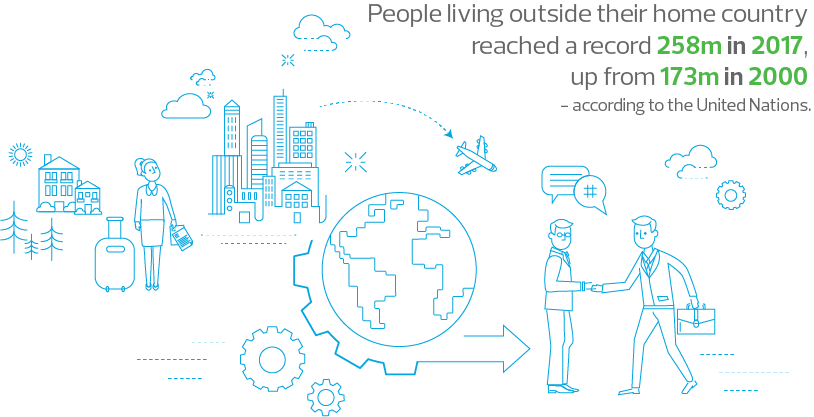One issue stands out for every middle-market business that operates internationally: the struggle to find and retain the most skilled and innovative employees — those who will drive growth and company performance.
"Success is achieved not just by a set of human resources processes, but by placing people’s creativity at the heart of an organisation’s ambition."
McKinsey and Co. coined the term ‘war for talent’ in 1997. It is a never-ending conflict. The issue is becoming even more crucial now as globalisation appears to have stalled, the regulatory landscape shifts and populist politics threatens to make it harder to hire internationally or move staff freely across borders.
Companies that can navigate this complex environment will have a massive advantage. They must be smart in mastering migration rules, locate operations where they stand the best chance of getting skilled staff at an affordable cost, use automation and communications effectively and encourage the development of talent from within.
Above all, they must be people-friendly and make sure they are seen as the place where the best employees want to work. Success is achieved not just by a set of human resources processes, but by placing people’s creativity at the heart of an organisation’s ambition.
Migration is likely to be at or near the top of the political agenda for years to come, with serious implications for employers. It was a big factor behind the UK’s referendum vote to leave the European Union in 2016. Donald Trump’s promises on immigration helped to take him to the White House.
It is not all just one-way pressure to curb migration. Mr Trump has not managed to build a wall on the US-Mexico border and has had to scale back his effort to limit immigration from a number of Muslim-majority countries. The British government has had to soften its harsh treatment of long-term residents who originally came from the Caribbean. However, anti-migrant pressures are present in many countries.

In this rapidly shifting environment, employers need to think carefully about where they locate their offices and factories. Uncertainty is something that they will simply have to deal with.
It will be hard to close borders completely, given how dependent many businesses are on finding people with the right skills, as well as refugee flows. People living outside their home country reached a record 258m in 2017, up from 173m in 2000, according to the United Nations.
That is a modest increase from 2.8 per cent to 3.4 per cent of the world’s population, though high-income countries have seen a much bigger rise in migrants as a fraction of their population from 9.6 per cent in 2000 to 14 per cent in 2017. India has the largest number of people born in the country who are now living outside its borders, followed by Mexico.
In dealing with these issues, mid-market companies can be more flexible and innovative than their larger counterparts, if they get their strategies right. They can be opportunistic in spotting areas of comparative advantage as long as they are adaptable and resilient.
"To maximise the benefit of talent within organisations, companies will need to embrace diversity and hire from all sections of society."
Skill shortages exist to varying degrees in every market, so employers need to research the cost and availability of talent carefully and if necessary move the location of some operations. They must make sure they incentivise their people correctly and consider how roles will change with automation and artificial intelligence.
According to research by recruitment company Hays, “talent mismatches” — the gap between the skills employers are looking for, and the skills available in the labour market — are particularly acute in Brazil, Japan and the US.
To maximise the benefit of talent within organisations, companies will need to embrace diversity and hire from all sections of society. They must also strive to eliminate gender pay gaps and put checks and balances in place to make sure these do not arise inadvertently.
Some will need to do more training to meet their talent needs and also encourage employees to take responsibility for their own development, perhaps through online courses. Lifelong learning is becoming an urgent necessity as skills change rapidly.
One of the most important issues is how much is funded by employers and how much by the state and individuals. Singapore, for example, has learning credits that over-25s can draw on. The Nordic countries and the Netherlands and Canada have also won praise for their programmes. The global picture is patchy, however. Companies cannot wait for this to be resolved: they must take the initiative to meet their vital needs.
The growth of non-standard forms of employment widens options for companies and workers. Digital freelance work platforms, for example, can make it less costly to get work done while allowing workers in lower-income countries to offer their skills worldwide. A study by the Organisation for Economic Co-operation and Development found that the Philippines, Bangladesh, India and Pakistan were among countries with the highest freelancer earnings, while employers in Israel, Singapore and Australia were among the highest users.
Employers that get these things right will find they can succeed, even in an environment where shifting regulations and volatile politics make recruitment and workforce planning difficult.







